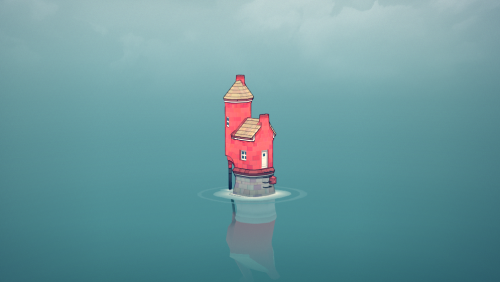Townsclipper 
Townscaper clipboard data format converter.
Encodes and decodes towns in clipboard (text) into various other formats. For example, it can turn this...
FC5ADI3TQN
...into this...
...and back again!
Concepts
-
Voxels: Each little cube that we build the town with.
-
Types: The different colors of voxels. Also empty (air) and ground.
-
Corners: Each possible construction point in the grid. Contains a column of voxels (or empty space) in a specific X and Y coordinate.
-
Clip string: Clipboard save string, as generated when clicking the "Save to Clipboard" button in Townscaper.
-
Bit string: Raw binary data decoded from clip strings.
-
Dense Representation: A JSON representation of the data inside a clip string. Some details are abstracted away since they can be calculated.
Although multiple DRs can generate the same bit string (and vice versa) they can be transformed univocally as long as the least number of bits is used.
Internally:
- Corner positions are represented as deltas (
x) and offsets (y). - Voxels are represented as a dense array of types (column in that corner) from lowest to highest.
- Corner positions are represented as deltas (
-
Scape files: Towns as stored in disk, in plain XML format. In Windows they are stored as a bunch of
Town*.scapefiles in%appdata%\..\LocalLow\Oskar Stalberg\Townscaper\(i.e.C:\Users\<username>\AppData\LocalLow\Oskar Stalberg\Townscaper\). Chris Love has a great writeup about these.Long story short: they are a list of corners
(x, y, number of voxels)and another list of voxels(height, type)in order of appearance in corners. -
Sparse Representation: JSON representation with voxels in sparse form (similar to Scape files).
CLI
Installation requires Node.js (latest LTS should work) and NPM or Yarn. First install globally (you might need root/admin permissions):
npm install -g townsclipper# Or with Yarn yarn global add townsclipperIt will install the townsc command-line tool. Use townsc --help for instructions.
You can also use it locally without -g or global, but you'll have to run it in that specific
folder via ./node_modules/.bin/townsc.js.
Examples
-
Inspect a save string as dense representation
townsc clip dense --pretty ASJAJ6Za1TAa -
Same, but reading from a file (or any stdin for that matter)
cat myFile | townsc clip dense --pretty -
Replace red blocks with blue
townsc clip dense ASJAJ6Za1TAa |sed 's/"types":\[0]/"types":\[9]/' |townsc dense clip -
Edit savestring data as sparse in Vim
tmpfile=$(mktemp) &&townsc clip sparse --pretty ASJAJ6Za1TAa > $tmpfile &&vim $tmpfile &&cat $tmpfile | townsc sparse clip &&rm $tmpfile(TIP: Make a shell alias out of this!)
Library
You can programatically use Townsclipper as a library (both NodeJS and browser via bundler should
work). See ./lib/index.js.
npm install --save townsclipper
# Or with Yarn
yarn add townsclipper
Contributing 
Just test the CLI and library! Use it! Break it! Enjoy it! And report any bugs :P
Pull requests are welcome. Fork
this repository! For now we're just working on master since were aren't even v1.0.
Do a global search for TODO to see what's pending to do or discuss.
Rules:
-
Clipboard strings should match Townscaper's. If you can make them shorter, hide the behavior behind a flag (but make it on by default!)
-
JSON string output doesn't have to match exactly as long as it parses the same.
-
Be explicit in Dense Representation. I'd rather have a
nullvalue than a missing key (seexDelta). -
When in doubt, do what Townscaper does.
-
yarn testshouldn't break, and you should add the relevant tests (if any) to your changes. -
yarn test:diffoutputs a test set into thetest_outfolder. Inspect differences (if any) ingit diffto check that everything is working as intended. Feel free to add tests cases if needed. Remember to committest_outso we can usegit diffwith your changes!
TODO
-
The grid is irregular and we need it if we want to generate valid coordinates. Chris Love has done some research on this (Twitter thread).
Even though eventually the grid size is locked when you build enough, it's actually infinite. To see it in action, scroll before building any blocks.
Some people have shared filled patches, and the code in http://scriptology.de/townscaper.html has a list of valid corners, but they are just a limited set. This library used to have a
VALID_CORNERSlist too but it was from a specific filled patch (before I realized the grid limits were arbitrary and procedurally infinite).I'd rather not encourage using a specific patch, hence why I removed the
VALID_CORNERS. For now you'll have to generate your own list of valid corners if needed, but ideally we'd understand the algorithm.See https://www.youtube.com/watch?v=1hqt8JkYRdI for more info.
- Maybe use this to check if corners are valid in dense and sparse (from and to)?
-
Test:
denseToBitsmissing cases -
Maybe don't implicitly remove empty corners and warn intead? Applies to various conversions in dense, sparse, bits.
- This might require having a warning system versus just throwing.
-
Maybe be more lenient with input as long as it doesn't break output (e.g. from dense to sparse, why not accept too many
types?) On the other hand, it might help catch bugs.More instances: accept
0orundefinedwhen expectingnull, etc. -
Online version for people that can't/won't use the CLI.
-
Some kind of random generator to showcase the possibilities.
-
/dev/clipboard example (what about MINGW64? I've been unable to make Node's stdout work)
-
Move
test:diffto Jest -
Remove trailing
-1s inbitsToDenseanddenseToBits?-
Can of worms? It would make sense to also do things like sort types in Townscaper order
-
OTOH we're already removing empty corners
-
Annotate might already be broken since
bitsToDensemight lose information -
Maybe hide behind
--optimizeflag, or--no-optimize
-
